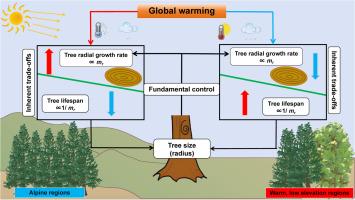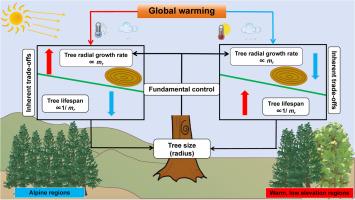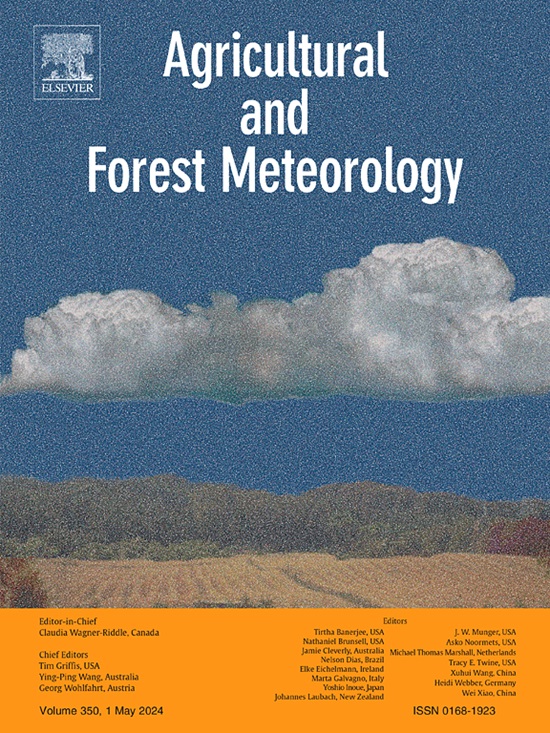北半球树木径向生长的趋同与分化
IF 5.6
1区 农林科学
Q1 AGRONOMY
引用次数: 0
摘要
树木径向生长既记录了树木的生长趋势,也记录了环境信息。虽然前者通常被排除在气候-生长分析之外,但其逐渐变化对森林碳固存的影响更为深远。阐明这一内在趋势背后的动力学机制将大大提高我们对气候-生长关系的理解和预测。迭代生长模型(IGM)及其扩展模型将生物的生长、寿命和呼吸作用联系在一起,为我们深入了解这一趋势提供了重要依据。在此,我们将迭代生长模型(IGM)扩展到树环尺度(IGMR),并利用北半球的树环宽度数据集来分析树木的本体生长趋势对径向生长率(沿半径梯度)的制约。在此基础上,我们进一步阐明了这些生长趋势在不同气候类型和支系中的趋同性和差异性。结果表明(i) 树木的本体生长趋势导致径向生长率沿半径梯度呈典型的单峰模式。(ii) 这种单峰模式是树木径向大小、代谢指数和维持代谢率的函数,限制了树木径向生长对气候的响应。(iii) 本体生长趋势导致树木径向生长速率与寿命之间的内在权衡。总之,不同的生长驱动因素不会改变树木大小对径向生长的制约作用。在未来的气候-生长关系研究中,应考虑个体发育的生长趋势。本文章由计算机程序翻译,如有差异,请以英文原文为准。


Convergence and differentiation of tree radial growth in the Northern Hemisphere
Tree radial growth records both ontogenetic growth trends and environmental information. Although the former is usually excluded from climate-growth analyses, its gradual changes have a more profound effect on forest carbon sequestration. Elucidating the kinetic mechanism behind this intrinsic trend will greatly improve our understanding and prediction of climate-growth relationships. The iterative growth model (IGM) and its extensions link organism growth, lifespan, and respiration, providing important insights into this trend. Here, we extended the IGM to the tree-ring scale (IGMR) and used tree-ring width datasets across the Northern Hemisphere to analyse the constraints of tree ontogenetic growth trends on radial growth rate (along the radius gradient). On this basis, we further elucidated the convergence and differentiation of these growth trends across different climate types and clades. The results showed that: (i) ontogenetic growth trends of trees cause the radial growth rate to follow a typical unimodal pattern along the radius gradient. (ii) This unimodal pattern is a function of tree radial size, metabolic exponent, and maintenance metabolic rate, constraining the response of tree radial growth to climate. (iii) Ontogenetic growth trends result in an inherent trade-off between tree radial growth rate and lifespan. In conclusion, different growth drivers do not alter the constraining effect of tree size on radial growth. Ontogenetic growth trends should be considered in future studies of climate-growth relationships.
求助全文
通过发布文献求助,成功后即可免费获取论文全文。
去求助
来源期刊
CiteScore
10.30
自引率
9.70%
发文量
415
审稿时长
69 days
期刊介绍:
Agricultural and Forest Meteorology is an international journal for the publication of original articles and reviews on the inter-relationship between meteorology, agriculture, forestry, and natural ecosystems. Emphasis is on basic and applied scientific research relevant to practical problems in the field of plant and soil sciences, ecology and biogeochemistry as affected by weather as well as climate variability and change. Theoretical models should be tested against experimental data. Articles must appeal to an international audience. Special issues devoted to single topics are also published.
Typical topics include canopy micrometeorology (e.g. canopy radiation transfer, turbulence near the ground, evapotranspiration, energy balance, fluxes of trace gases), micrometeorological instrumentation (e.g., sensors for trace gases, flux measurement instruments, radiation measurement techniques), aerobiology (e.g. the dispersion of pollen, spores, insects and pesticides), biometeorology (e.g. the effect of weather and climate on plant distribution, crop yield, water-use efficiency, and plant phenology), forest-fire/weather interactions, and feedbacks from vegetation to weather and the climate system.

 求助内容:
求助内容: 应助结果提醒方式:
应助结果提醒方式:


